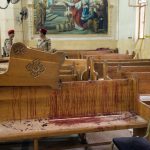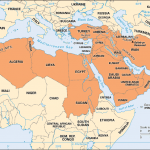By Mada Masr –
The ongoing targeting of Coptic Christians in North Sinai by militants has lead to multiple cases of “forced displacement … which cannot be downplayed as incidents of voluntary departure or mass migration to escape an armed conflict,” according to a report issued by the Egyptian Initiative for Personal Rights (EIPR) on Tuesday.
Titled “Declared Dead,” the report details the lengthy historical context preceding the forced displacement of Copts, pointing to authorities’ continued tolerance of resorting to customary reconciliation sessions to deal with acts of sectarian violence, calling it a failure to ensure the application of domestic law.
EIPR also blames security forces for “failing” their legal and constitutional obligation to protect Coptic Christians’ right to life, and to ensure that they are not subjected to forced displacement. The report notes the lengthy time span over which incidents of targeted violence can be traced, “which should have facilitated effective planning and intervention to protect” the Coptic community, adding that the attacks and forced displacement must also be viewed in light of “the fact of the widespread deployment of security forces and military troops in the area.”
The research is based primarily on the testimonies of the North Sinai Copts forced to flee their homes in February following a sharp increase in the number of targeted attacks in and around governorate’s capital, Arish. Militants have killed at least eight citizens this year, most recently Nabil Saber, who was shot dead by gunmen on April 6 in his barber shop. Saber and his family were forcefully displaced to Port Said, he was required to return to Arish to obtain paperwork to ensure his children would be permitted to sit their school exams.
In early May the Islamic State’s online publication Al-Nabaa published an interview with the an alleged leader of the one of the organization’s affiliates, who issued direct threats against Copts, warning Egyptian Muslims to stay away from churches and Christian gatherings, which it described as “legitimate targets.”
According to EIPR, recent acts of violence against Coptic Christians have taken several forms, including physical attacks on the basis of religious identity and preventing Copts from practicing their religious rituals. The report also cites resistance to the construction of churches in Egypt and sectarian tensions associated with inter-faith relationships.
Copts are also targeted by infringements on their freedom of expression, particularly the public discussion of religious matters which, EIPR writes, often ends with lawsuits being filed against Copts who are accused of contempt of religion. The EIPR report also alludes to incidents of sectarian violence associated with Coptic participation in political campaigns and elections.
While the kidnapping of Copts for ransom payments may not necessarily have sectarian motives, EIPR writes that it too contributes to the “vulnerability of Copts,” particularly in light of the seeming official leniency shown in such cases which it potentially attributes to the weak security presence following the January 25 revolution.
The report also addresses the difficulties facing the estimated 475 Coptic families living in North Sinai. Most relocated to the governorate in the late 1980s and are centered in Arish. Despite the presence of six churches in North Sinai, their direct involvement in the local economy and relative scarcity of incidents of sectarian violence, EIPR writes that they are still socially marginalized.
The tribal nature of North Sinai society places Coptic Christians in what the report calls a social periphery, whereby they are granted rights of residence, freedom of movement and employment but lack of a leading role in society, which deprives them of “influence on par with that of tribal leaders.”
Other forms of social discrimination facing North Sinai Copts include the obligation for some women to wear headscarves, employment discrimination and some others designating them ‘infidels.’
According to EIPR, the tribalism of North Sinai also means that residents tend to view newcomers as competitors for limited resources and job opportunities, particularly in light of the ongoing economic crisis. As newcomers, Copts are typically less welcome than Muslims, “as the bond of religion provides some added level of social protection to Muslim newcomers.”
“Sectarian and tribal dimensions cannot be separated in North Sinai” EIPR writes, as “Copts are not from local families, clans or tribes.” Neither social nor religious groups offer Copts the same level of protection as their Muslim counterparts who have resettled from the Nile Valley.
Churches in North Sinai have been subject to various attacks and threats since the 2011 revolution. Between 2012 and 2013, during the presidency of former President Mohamed Morsi. During this time Copts report being intimidated by the Muslim Brotherhood group and their supporters who distributed leaflets demanding they leave the area and fired shots at their homes and places of work.
The first half of 2013 also saw six incidents of kidnapping for ransom. Aside from the case of Sameh Awadallah, who managed to escape from his assailants, all abductees were returned following the payment of the ransom.
Copts continued to be intimidated, threatened and see their rights violated following the military-led ouster of Morsi in July 2013. Three murders took place, and the St. George Church in Arish was torched. While 2014 witnessed a slight decline in violent incidents targeting Copts, these increased again in the following two years with the murder of two Copts and one attempted murder before targeted attacks increased again this year.
In a recent case, masked assailants murdered Arish Copt Wael Youssef inside his shop, and then proceeded to eat and drink the goods found within. They reportedly went on to steal from the store, which EIPR says indicates a “confidence that police would not be deployed, even though this incident took place in midday, and before an audience of citizens.”
____________________
EIPR report: Targeting of North Sinai Copts leads to forced displacement, not voluntary departure
Photo Credit: Samuel Mohsen





